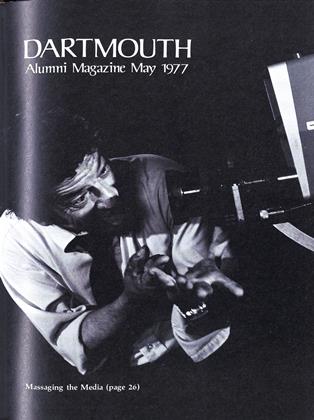"RUGBY is my religion," said the old Englishman as he pulled on his pint of bitter. "It's the only true religion," he repeated, wiping the foam from his moustache, "or so I tell my wife."
The scene was the bar in the clubhouse of the Marlowe Rugby Football Club, outside London, after the Dartmouth ruggers' first game of their spring trip to England. The game had been played at night under the lights of the Marlowe field, and the Marlowe players were giving postgame pointers to the visiting Americans dazed from jet lag and manfully swilling the warm beer.
For a rugby clubhouse the scene was comparatively peaceful, but rugby tours have a way of courting trouble. Last year, a New Zealand team's trip to South Africa ultimately led to an African boycott of the Olympics. Before that, a plane crash in the Andes by a touring Venezuelan team occasioned cannibalism, a best-selling book, and a feature movie. Some ebullient Dartmouth players tried out their streaking skills on a Bermuda beach a few years ago and caused a diplomatic incident.
Dartmouth has created other sensations on tour. In 1958, when the Green ruggers first traveled to England, they compiled a 7-2 record. This so astounded the British that a sportswriter for the Daily Telegraph felt compelled to comment: "The British are not used to rude reverses, but this victory of an American Rugby XV must be considered one of the nastiest upsets since Bunker Hill."
During the two weeks this last March that the Dartmouth Rugby Football Club spent as guests of University College, London, the players slogged through miles of mud on British playing fields and slugged gallons of beer at the mercies of British hospitality. "England on Five Pints a Day" became the sobriquet of the tour, and, when the losses to British teams began to mount up, a Dartmouth junior could announce with pride: "We may not be doing too well on the field, but in the clubhouse we're undefeated."
And in the clubhouses Dartmouth learned what rugby means to an Englishman.
Barry O'Brian, Dartmouth's host: "In Britain, you can play rugby for club, county, and country, but you're always an amateur. Even when a rugger is playing in front of 100,000 people, he isn't making a penny. In the U.S. the major sports are all so commercial, with professionals and all. Here in Britain, we rugby players are all amateurs and we pay our own way. We run the bar, we build the clubhouse, and we take the bad seasons with the good seasons."
Member of the Purley Rugby Football Club: "The kind of player who plays rugby plays rugby only for the game. His main interest is in his profession - what he does Monday to Friday. The soccer player comes from a background of coal or steel and sees his sport as a way out. I work for Exxon, and I play rugby because when I get moved around I know that if I join a rugby club I'll find people there of my own social background. There's a lot more to a club than just the game - a lot for the wives and the families in the way of social activities."
When Dartmouth entered the field against the London Irish, it faced one of the club's eight teams. The London Irish maintain three rugby fields and a clubhouse complete with lockers, covered viewing stand, and two bars with an inside view of the fields. On any Saturday the club can field 200 players ranging in age and skill from adolescent to international class player. The club has 500 members in all and even offers classes in yoga.
Well-pickled Englishmen: "Rugby is the kind of thing where you can punch heads and take a swing at someone on the field, then walk away from it when the whistle blows and have a drink with your opponent and forget about it. It's sport."
For Dartmouth, the glory would wait until the team's return to the States and the Ivy League Tournament in April. The lessons of international play were the deciding factor as Dartmouth avenged last year's second place finish to take tournament honors by defeating Yale in the finals.
The glories of amateur sport: sophomore ruggers David Van Wie (left) and L. Philip Odence in London.
 View Full Issue
View Full Issue
More From This Issue
-
 Feature
FeatureWomen at the Top (almost)
May 1977 By SHELBY GRANTHAM -
 Feature
FeatureOISER: Massaging the Media
May 1977 By PIERRE KIRCH -
 Feature
FeatureNatural Energy Resource
May 1977 -
 Feature
FeatureGold-Medal Equestrian
May 1977 By M.B.R. -
 Article
ArticleWar
May 1977 By JACK DEGANGE -
 Article
ArticlePaddler, Climber, 4-term Planner
May 1977 By D.M.N.
Article
-
 Article
ArticleConvocation Address
November 1949 -
 Article
ArticleThe Doctor is In Oxford
April 1993 -
 Article
ArticleBOSTON ASSOCIATION
APRIL, 1927 By C. E. LEECH 'l4. -
 Article
ArticleTHE FACULTY
APRIL 1963 By GEORGE O'CONNELL -
 Article
ArticleThe Faculty
February 1951 By HAROLD L. BOND '42 -
 Article
ArticleMiss Minnie Crosby of the DCAC
OCTOBER 1963 By JACK HURD '21


